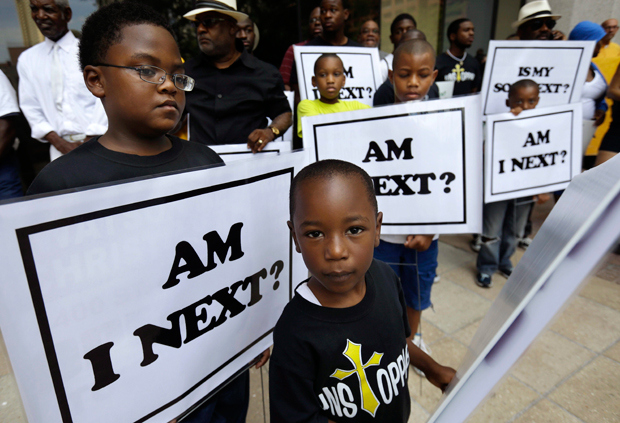Most of the clashes between Democrats and Republicans, liberals and conservatives can be boiled down to one thing: Do we believe in individualism vs. collectivism?
Videos By Rare
Do our lives belong to us—or the government?
Those of who value liberty usually come down on the side of individualism. They don’t trust the government to dictate how we should drink, eat, smoke, or spend our money (or, nowadays, not spend our money); and believe every person has inherent value and the right to make their own choices.
But while individualism is important, it doesn’t tell the whole story. Social structures do exist, particularly those created by government.
The concept of social structures can be vague, so let’s make at least one concrete—look at the way our justice system treats minorities.
The war on drugs is an obvious example.
Black and white people use marijuana at almost identical rates, but black people are four times more likely to be arrested for smoking pot—in fact, “in some states, including Iowa, Minnesota and Illinois, blacks were around eight times as likely to be arrested.”
Once convicted (which is also more likely), black people are usually assured a harsher sentence than white people convicted of the exact same behavior. Black drug offenders are 27% more likely to go to jail than their white counterparts (a figure which jumps to a whopping 800% in Chicago), and prison time for crimes across the board averages 60% longer for blacks than whites.
Some laws even specifically target minorities. For more than two decades, mandatory sentences for the use of crack cocaine were 100 times more severe than the sentence for powder cocaine use.
Now, crack isn’t actually more dangerous than powder cocaine, but there is a significant difference in who tends to use each drug. Crack has historically been more popular with the poor and minorities, while “blow” is favored by wealthy whites.
These are massive differences. Why are minorities treated so unfairly?
Let’s take a look at another racially-charged justice issue which has dominated news cycles of late: Stand Your Ground (SYG) laws.
Like drug prohibition, Stand Your Ground laws are made with good intentions: They’re designed to give people more options in defending themselves in dangerous situations. Some make the case that these laws strengthen Second Amendment rights, and the evidence for whether SYG laws raise or lower murder rates is mixed.
But one thing is clear: SYG laws contribute to the justice system’s structural bias against minorities. The racial disparities associated with SYG laws are even grimmer than our drug laws.
A study on race, SYG laws, and justifiable homicide shows that in SYG states, “the shooting of a black person by a white person is found justifiable 17 percent of the time, while the shooting of a white person by a black person is deemed justifiable just over 1 percent of the time.” In non-SYG states, the gap between those averages is lowered by 50 percent.
In other words, the Stand Your Ground defense plays well with juries when the accused is white, but minorities have less luck.
As the Daily Show’s Jessica Williams put it, “The Stand Your Ground defense is like bleach: It works miracles for whites but it will ruin your colors.”
So why this disparity? Why are well-intentioned laws enforced with such a clear structural bias against minorities?
Why is our justice system so… unjust?
Well, the collectivist answer is gross stereotypes. “Black people are all drug addicts,” the collectivist might say in response to these drug war numbers—but that’s simply not true. Or, “Gun nuts are all racists,” but that’s not true either.
The individualist answer gets us closer to the truth: While many people in our justice system are not racist, some undoubtedly are. Maybe those individuals are on juries, the police force, or the judge’s bench are just abusing their power to treat black people unfairly.
While that’s likely true, in a nation as large and diverse as the United States, it isn’t an adequate explanation.
The reason that racial disparities in our justice system are widespread and extreme enough to be dubbed “the new Jim Crow” is that we have a structural problem.
The inherent racism of our justice system is larger than the individuals involved or ensnared. It wouldn’t be solved even if every vestige of racism residing in every individual, everywhere in America , was somehow magically eliminated.
The core issue—the racist structure created by bad laws—would still remain. Police would still have quotas to fill, and it would still be easier for them to “concentrate on minority or poorer neighborhoods to meet numerical goals, focusing on low-level [drug] offenses that are easier, quicker and cheaper than investigating serious felony crimes.”
And that’s why Stand Your Ground laws, like the war on drugs, are bad for liberty: If a people or group is unequally jailed for equal actions, they are not equally free.
In practice, these laws contribute to social structures that have given us the largest prison population and the highest incarceration rate in the world, with minority communities bearing the brunt of these tragic numbers.
To dismissively chalk this systemic problem up to occasional racist jurors or any other aside and simply dismiss it is not realistic, nor is it good enough. It is to not care.
The great individualist-in-chief, Ayn Rand, said, “Those who deny individual rights cannot claim to be defenders of minorities.”
Individualists who ignore social structures can’t claim it either.

